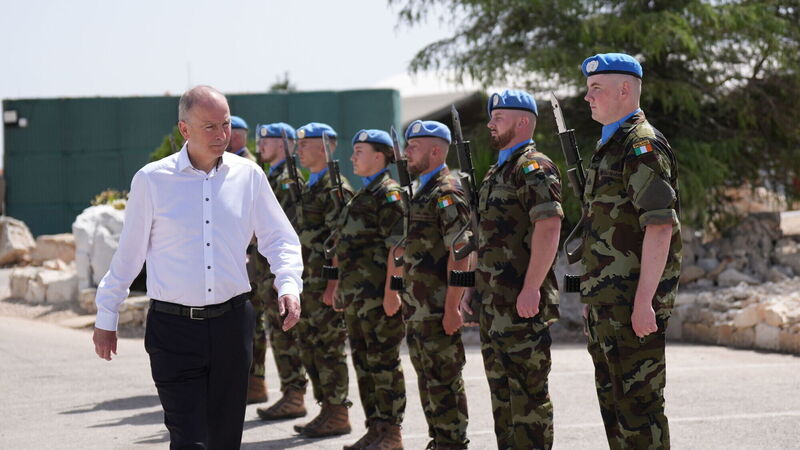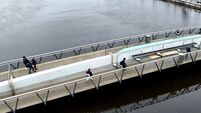Cork politics: The fight over Irish neutrality heating up

When Micheál Martin was defence minister he argued that the triple lock should be removed. Picture: Niall Carson/PA Wire
Last month, ambassadors from six ‘frontline’ Eastern European states — countries which have been occupied by Russia — told this newspaper that neither neutrality nor distance would protect Ireland from an increasingly aggressive Moscow.
With US president Donald Trump upending in three months what had been the world security order of eight decades, there is a growing acceptance that Europe will have to take a lead on its own defence.
Irish neutrality is now being discussed more urgently, with attention turning to the defence of the undersea cables off our coast and the so-called triple lock, which dictates the deployment overseas of Irish troops.
More than 95% of international data traffic is carried along undersea fibre-optic cables, with 75% of all transatlantic cables passing along the seabed through, or close to, Irish waters.
In March, ambassadors from Ukraine, Estonia, Poland, Finland, Lithuania, and Latvia told The Echo that Ireland hosts critical global infrastructure and is especially vulnerable to hostile action.
Ireland’s neutrality and geographical distance would not matter, Ukrainian ambassador Gerasko Larysa said.
“From time to time, you can see Russian submarines not far from West Cork, so you are very close,” she said.
The ambassadors also raised the issue of Ireland’s ‘triple lock’, which prevents the deployment of more than 12 Irish troops overseas without the approval of the Government and the Dáil, and a United Nations (UN) mandate.
Last year, when he was defence minister, Taoiseach Mícheál Martin repeatedly argued that the triple lock needed to be changed, and now Tánaiste Simon Harris, the current minister, is preparing legislation to do just that.
The triple lock dates, in effect, back to a 1960 amendment to the Defence Act 1954, the principal statute governing the Defence Forces, which was intended to allow deployment in UN peacekeeping missions.
At the start of this century, in an effort to address concerns that the Nice and Lisbon treaties might undermine neutrality, this rule was restated, with the added limitation that no more than 12 troops could be deployed on an active mission overseas without a government decision; the approval of the Dáil; and the authorisation of the UN.
With Cabinet approval for planned legislative changes already given, Mr Harris has said the focus is on ending the veto that permanent members of the UN Security Council have on Irish participation in peacekeeping missions.
Noting that the Irish people were proud of the role played by members of the Defence Forces in peacekeeping missions across the world, the Tánaiste said that under the triple lock, permanent members of the UN Security Council, such as Russia, had the power to veto Ireland’s participation in missions.
“We don’t believe that Putin or other leaders should have a veto on whether our troops can be deployed,” Mr Harris said.
That sentiment was echoed by Lithuanian ambassador Jonas Grinevičius, who last month told this newspaper: “A double lock is OK, because then you exercise your sovereignty with your government and parliament, but the triple one looks like an excuse not to do much on the international arena.
“Why would you want to give some permanent members of the UN Security Council a veto on your actions?”
However, Ireland’s long-standing military neutrality is extremely popular, and with many people opposing any change to the triple lock, the Government will have a fight on its hands. Both the Taoiseach and the Tánaiste have insisted that changing the triple lock will not affect Ireland’s neutrality, but opponents disagree.
Dominic Carroll, of Action Against War (Cork), noted that Mr Martin had, a decade ago, insisted that the triple lock was at the heart of Ireland’s neutrality.
“But having decided to abolish the triple lock, under pressure from EU partners and Nato, he now says that, no, it’s not at the heart of our neutrality. This beggars belief,” he said.
“Ditching the triple lock would be the most significant breach of what little is left of Ireland’s neutrality, as it will remove a major obstacle to Ireland’s full integration in to the EU common security and defence policy.
“It’s clear that if the triple lock is scrapped, the Irish Defence Forces will ramp up their involvement in EU military structures,” he claimed.
However, Seán Martin, Fianna Fáil city councillor, and brother to the Taoiseach, said the invasion of Ukraine by Russia had changed attitudes toward security in Europe.
“When you see countries like Sweden rushing to join Nato, despite their long record of neutrality, you can see how much times have changed,” Mr Martin said.
“I think, removing the triple lock only has the effect of reclaiming for the Dáil the sole right to decide where and when we deploy Irish troops,” he said.
“Read the history of the 1930s: People stood idly by until it was too late, and I think that when times are changing, you have to modify your stance.
“No one is talking about going in to a war, or anything like that, we’re just talking about giving the Dáil the power to make a decision. That’s all.”
Ted Tynan, Cork city councillor for the Workers’ Party, said that Ireland was being dragged in to a European “war economy”, and that it would be the most vulnerable in Irish society who would suffer as a result.
“The important thing is that we reinforce Irish neutrality, so that Ireland doesn’t get sucked in to European army manoeuvres.
“We should not be getting involved in wars.
“We have a very good reputation as peacekeepers in Lebanon, Cyprus, and other places, and I think we should stand by that history as peacekeepers,” Mr Tynan said.
“War creates destruction, division, and death, and the war between Russia and Ukraine, at the moment, is ridiculous, it’s the destruction of so many lives, people buried under rubble, just like in Gaza.
“It’s crazy, it doesn’t make sense. Let’s get on and build a peaceful society and end all these stupid wars.”
Damian Boylan, Fine Gael city councillor, said that if Ireland was truly a sovereign nation, it should assert that sovereignty and control the deployment of its own troops.
“If we trust the Dáil to run the country, then, surely to God, we should trust the Dáil to mandate where our troops go,” Mr Boylan said.
“If there is a situation where we want to send our troops for peacekeeping or humanitarian aid and the Russians or someone else doesn’t like the look of it, are we going to continue to allow them to stop it?
“The world is a very different place than it was 20 years ago, or even 10 years ago, or even five years ago.
“We can’t rely on bad faith actors to make the rules that we abide by.
“I think it’s time for the triple lock to go,” Mr Boylan said.
Labour senator Laura Harmon said it was important that Ireland was clear that it was pro-peace and pro-human rights.
“This means we need to stop any war planes passing through Shannon Airport,” she said.
“It’s important that Ireland steps up and passes the Occupied Territories Bill to stand up to the genocidal state of Israel.
“We also need continue to support Ukraine in their journey for self-determination.
“One of the biggest threats to Ireland’s security is the fact that we need to invest in our Defence Forces, in terms of their pay and conditions, to ensure we can attract staff and retain them.’’
Michael Collins, leader of Independent Ireland and TD for Cork South-West, described the triple lock as “a cornerstone of our independent foreign policy”, but he cautioned that the security of Ireland’s shores and underwater cables was a source of concern.
“Incidents like the presence of the Russian surveillance vessel Yantar near these cables in Irish waters, in November 2024, highlight new vulnerabilities,” he said.
“However, addressing these threats does not require abandoning neutrality.
“Ireland can enhance its maritime security through domestic investment and bilateral cooperation without joining military alliances.
“The Government’s planned increase in defence spending must focus on supporting our military personnel and upgrading existing military defences at home.”
In a changed and increasingly turbulent world, it looks as though Ireland’s debate on neutrality is only beginning.







 App?
App?


